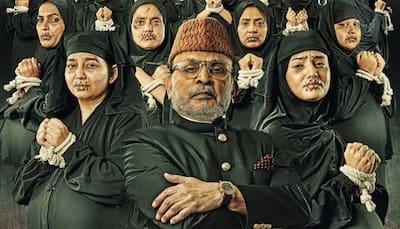
Mumbai: In a significant development, the Bombay High Court has given the green light for the release of the movie ‘Hamare Baarah’ after the filmmakers agreed to remove two contentious dialogues. Following the court’s direction, the film is set to premiere today, June 7.
Initially, the court’s progress was impeded by a three-member review committee that failed to reach a consensus, requiring additional time to submit their report. The court, however, expressed its dissatisfaction with this delay, stating, “It’s totally unacceptable that the committee has failed to fulfill its obligation given by this court specifically in its previous order.” In light of this, senior advocate Rahul Narichania, representing the filmmakers, acquiesced to omit the two dialogues in question to expedite the release process.
‘The film, featuring performances from notable actors such as Annu Kapoor, Manoj Joshi, and Paritosh Tripathi, had been the subject of a legal petition aiming to halt its release. The creators, including producers Birender Bhagat, Ravi S Gupta, Sanjay Nagpal, and Sheo Balak Singh, and director Kamal Chandra, have claimed that ‘Hamare Baarah’ offers a thought-provoking narrative focused on a pressing social issue – overpopulation. Despite its approval in other regions, the film has faced a temporary ban in Karnataka.
In a recent turn of events, the Karnataka government has enforced a two-week ban on the release and broadcast of ‘Hamare Baarah’ under sections 15(1) and 15(5) of the Karnataka Cinema Regulations Act 1964. This decision was made following suggestions from various minority organizations and delegations, compounded by concerns that the film could incite communal discord. Government authorities also scrutinized the film’s trailer before arriving at their verdict.
The movie, originally scheduled to release across the country on June 7, 2024, delves deep into the critical theme of overpopulation. This issue is depicted through a compelling story arc, earning both anticipation and controversy ahead of its release. Given the complex and sensitive nature of its subject matter, the film has navigated a labyrinth of legal and societal hurdles.
The friction between the film’s team and the review committee began when the latter failed to provide a conclusive report.
. The court’s dissatisfaction with this delay was evident when it sharply criticized the committee for not meeting its responsibilities. To avoid further entanglements, filmmaker representatives decided to remove the problematic dialogues, thus smoothing the path for the film’s immediate release.
Despite the successful clearance from the Bombay High Court, the cloud of the Karnataka government’s ban still looms large. Authorities in Karnataka have stringent rules regarding the release and broadcast of films that potentially stir communal tensions. The suspension under sections 15(1) and 15(5) of the Karnataka Cinema Regulations Act underscores the government’s cautious stance based on requests from minority groups and their analysis of the film’s trailer.
The prohibition extends for two weeks or until further official notice, potentially impacting the film’s reach in the state. This cautious approach reveals the delicate balance authorities strive to maintain between artistic expression and community harmony.
Meanwhile, the national film community watches closely as ‘Hamare Baarah’ navigates through these legal complexities. The case has ignited a broader discussion on the limits of creative freedom, censorship, and the role of governmental oversight in the arts. It also serves as a case study on how regional bans can affect the commercial and cultural journey of a film.
Jointly produced by a team comprising Birender Bhagat, Ravi S Gupta, Sanjay Nagpal, and Sheo Balak Singh, and directed by Kamal Chandra, the film promises to engage audiences with a gripping storyline that confronts one of today’s most critical issues. The collective hope among the filmmakers is that, despite the initial setbacks and regional bans, ‘Hamare Baarah’ will spark needed conversations about overpopulation and its repercussions.
As the film prepares for its national release, eyes will be on box office numbers, audience reception, and any further legal challenges that may arise. What remains clear is that ‘Hamare Baarah’ has already succeeded in drawing significant attention, both for its artistic content and the controversies enveloping its release.
In the coming days, both supporters and detractors will observe keenly how ‘Hamare Baarah’ performs, not just on the commercial front, but in its ability to foster dialogue and reflection on the societal issues it portrays.












